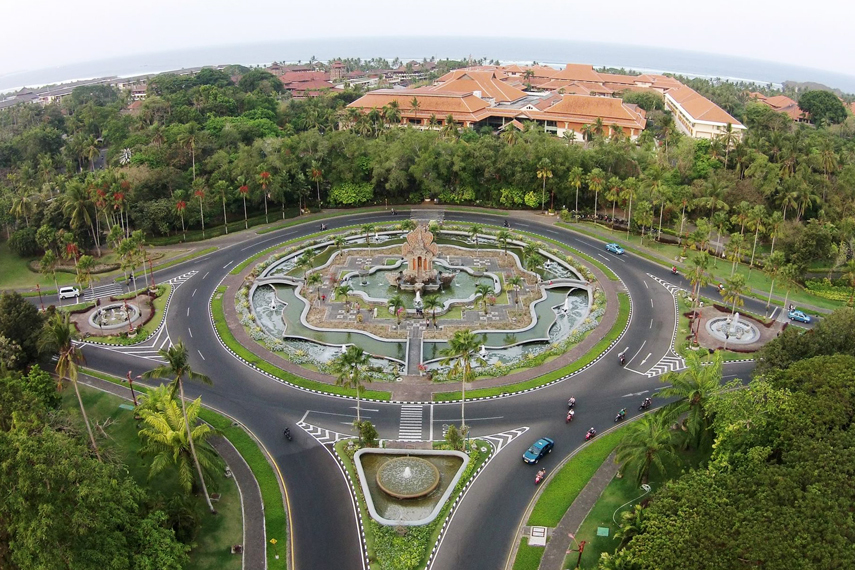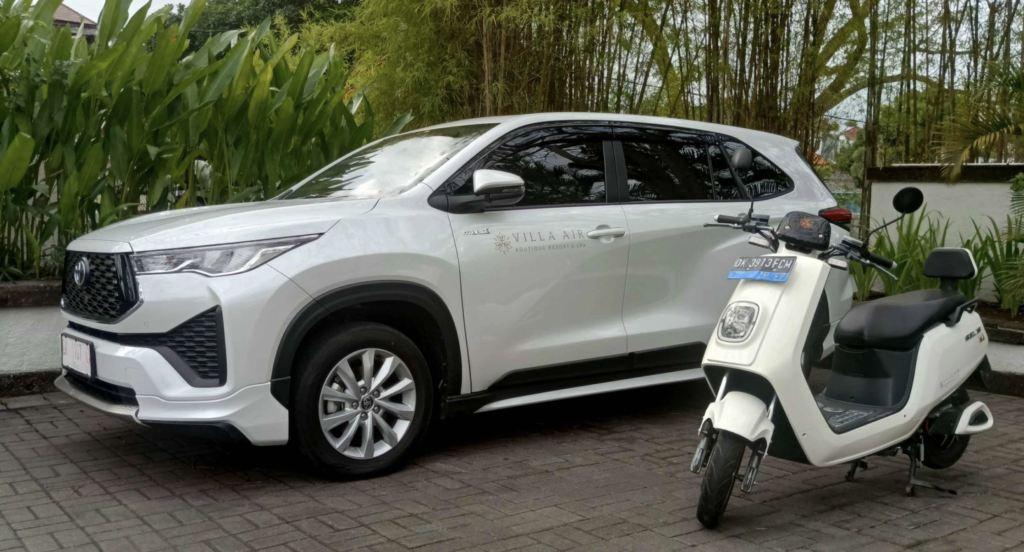Bali, famed for its cultural richness and paradisiacal landscapes, is steadily embracing electric vehicles (EVs) to enhance its tourism sustainability. A report from The Bali Sun reveals that electric vehicles may soon become a standard feature for tourists exploring the island, particularly in destinations like Nusa Dua, Seminyak, Canggu, and Ubud.
Nusa Dua Launches Electric Motorcycles for Tourists

One of the most tangible examples is the recent pilot program in Nusa Dua, where the Indonesia Tourism Development Corporation (ITDC) introduced 12 electric motorcycles—alongside battery exchange stations—to support eco‑friendly tourist mobility. These EV units not only reduce carbon emissions but also offer quieter, smoother rides along the resort corridors and nearby attractions, aligning with Bali’s ambition to become a cleaner, greener destination.
Seminyak and Canggu Embrace Green Mobility

Meanwhile, in Seminyak and Canggu, Villa Air Bali is making green mobility accessible at a more personalized level. Guests can now explore the area using the villa’s electric scooters and hybrid car, designed to minimize air pollution while offering intimate access to local hotspots like Pererenan, Seseh Beach, and Tanah Lot.
EVIC App: Making Electric Vehicle Use Easier in Bali
Beyond accommodation and resort-led initiatives, Bali’s regional authorities are playing a proactive role too. The Bali Transportation Agency launched the Electric Vehicle Information Center (EVIC) app—a comprehensive platform that helps users explore EV models, locate charging stations, access buyer reviews, and find EV service workshops. By alleviating concerns around battery life, range anxiety, or charging logistics, EVIC aims to boost confidence among both locals and visitors considering EV options.
Expansion Plans Across Key Tourist Zones
Further expansion of EV services is planned across Bali’s major tourist zones. The same agency intends to roll out similar electric transport offerings at destinations including Ubud, Sanur, Nusa Penida, and Besakih, targeting broader accessibility and deeply integrated sustainable infrastructure by 2026.
On the accommodation front, The Apurva Kempinski Bali stands out as the first resort on the island equipped with its own solar-powered EV charging hub. Guests staying at this luxury beachfront retreat can rent a Nissan LEAF and recharge it using solar panel infrastructure on-site. This program was developed through partnerships with Nissan, Bank Central Asia (BCA), and Danone Indonesia, reflecting a shared commitment to low-carbon tourism.
In another high‑profile effort, The Stones Hotel – Legian Bali, in partnership with Toyota Indonesia, launched an EV-powered airport shuttle service featuring Toyota electrified vehicles such as the Innova BEV, Prius Plug-In Hybrid, and Yaris Cross Hybrid. This ambassador project provides environmentally friendly transit between Ngurah Rai International Airport and the hotel, supporting Bali’s broader emissions reduction goals. Shuttle rates range from IDR 350,000 to 375,000++ per trip, accommodating up to three adults with luggage—all while reducing the overall carbon footprint of arriving guests.

Behind these individual projects lies Bali’s strategic vision to reach Net Zero Emissions by 2045, part of Indonesia’s national goal of NZE by 2060. The shift toward EV adoption is paired with renewable energy deployment, improved waste management, and vegetation conservation—positioning Bali as a leading model for sustainable tourism in Southeast Asia.
Benefits of Electric Vehicles Tourism for Bali
Reduced environmental impact: Electric Vehicles help cut transport-related emissions and noise pollution, preserving Bali’s natural and cultural environments.
Improved visitor experience: Tourists enjoy smoother, quieter rides—ideal for exploring culturally sensitive or serene locations.
Better infrastructure planning: With apps like EVIC and public charging stations rolled out island-wide, Bali is preparing for a scalable EV ecosystem.
Positive brand reinforcement: Hotels such as Apurva Kempinski and Stones Hotel demonstrate leadership in green hospitality, appealing to eco-conscious travelers.
Challenges remain—such as public awareness, range limitations, and initial costs—but Bali’s coordinated approach appears to be overcoming these through technology, incentives, and partnerships.
For tourists, this shift means greener and more comfortable ways to discover the island. For the island itself, it’s a tangible investment in preserving Bali’s beauty and culture for future generations—without sacrificing accessibility or visitor satisfaction.
Bali’s transition toward electric transportation is gaining momentum across resort, municipal, and public sectors. The blending of infrastructure, technology, and hospitality initiatives positions the island not just as a tourist hotspot, but as a benchmark for sustainable tourism advancement.
Read also: Green Living: Building a Sustainable Home



